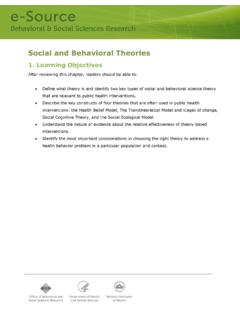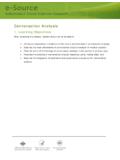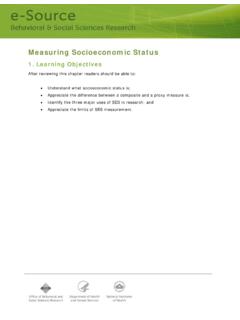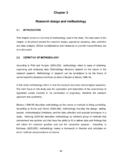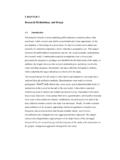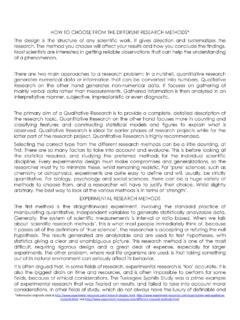Transcription of Design Decisions in Research - OBSSR e-Source
1 Design Decisions in Research 1. Learning Objectives After reviewing this chapter readers should be able to: Describe the steps of the Research process and key components of designing a study. Explain that the conceptual phase, including a conceptual or theoretical framework, underpins and organizes any Research study, quantitative or qualitative. Recognize that the study Design and methods are further determined by the problem to be examined, purpose of the study, and questions to be answered. Understand that rigorous methodological specification, implementation, and control of extraneous variables are necessary for valid and reliable statistical conclusions.
2 Recognize that the processes and outcomes of Research should be disseminated to appropriate audiences of professionals, policy makers and consumers in order to advance knowledge. 2. Introduction Health professionals rely on Research to improve the delivery and outcomes of health care for individuals, families, and communities. Research must be thoughtfully designed and rigorously conducted to produce accurate and generalizable results. Therefore, it is important for those conducting Research to develop expertise in the Design and conduct of Research . The reader is referred to Research textbooks for greater detail on specific designs or methodological challenges pertinent to a particular Design (Aday & Cornelius, 2006; Burns & Grove, 2004; Hulley et al.)
3 , 2006; Pedhazur & Smelkin, 1991; Polit & Beck, 2009). The purpose of this chapter is to provide an overview on Design Decisions to consider when planning a study. 2. Introduction Overview of the Research Process Designing Research requires careful consideration of the entire Research process, from the development of a Research question to dissemination of the results. Polit and Beck (2004) describe 5 phases to the Research process: the conceptual phase, the Design and planning phase, the empirical phase, the analytic phase, and the dissemination phase (Table 1). This chapter will focus on the first two phases, conceptualizing and planning a study; however, all phases will be described.
4 Design features of quantitative, qualitative, and mixed method Research will be addressed. Table 1: Overview of Research Process Research Phase Definition The Conceptual Phase Formulating the clinical problem, reviewing the literature, and determining the Research purpose The Design and Planning Phase Selecting a Research Design , developing study procedures, determining the sampling and data collection plan The Empirical Phase Collecting data and preparing data for analysis The Analytic Phase Analyzing the data and interpreting the results The Dissemination Phase Communicating results to appropriate audience Table previously published in: Whittemore, R. & Melkus, G.
5 (2008). Designing a Research study. The Diabetes Educator, 34, 201-216. 3. The Conceptual Phase The conceptual phase is the initial phase of Research and involves the intellectual process of developing a Research idea into a realistic and appropriate Research Design . This phase can be time-consuming, depending on the level of expertise of the investigator. During this phase, time is spent critiquing the literature on the topic of interest, continually refining and narrowing down the topic until a succinct Research problem and purpose have been determined. A thorough review of the literature needs to be conducted to fully understand: The scope and significance of the problem; The state of the science; and Gaps in the literature.
6 The existing Research on the topic of interest should be critically evaluated for strengths and limitations. Often it is helpful to discuss Research ideas with experts in the field too. Reviewing the literature and discussing Research ideas with experts will help guide the Design of the study. If very little is known about the topic, a descriptive study (qualitative or quantitative) will need to be undertaken. For example, little is know about African American women s beliefs about mental illness. Therefore, a qualitative study to identify African American women s beliefs, coping behaviors, and barriers to seeking mental health services was conducted (Ward, Clark, & Heidrich, 2009).
7 Results of this study have the potential to inform clinical assessment or development of an intervention to address identified barriers. 3. The Conceptual Phase If there is considerable evidence, but evidence is conflicting or lacks synthesis, an integrative or systematic review may be necessary. For example, numerous health technologies are available for persons with type 1 and type 2 diabetes. A systematic review was conducted to determine the effectiveness of self-monitoring devices related to diabetes, which has the potential to guide practice and future Research (Russell-Minda et al., 2009). The review of the literature will also help to identify the theoretical or conceptual framework of the study.
8 The theoretical framework informs the study organization and allows for results to be generalized to other groups and settings beyond those of the study (Polit & Beck, 2009). Theoretical frameworks are implicit or explicit and identify study variables, propose relationships to be tested, and can guide the intervention protocol for an experimental study (Polit & Beck, 2004). In a study evaluating a coping skills training program for youth with type 1 diabetes, the Adaptation to Chronic Illness model guided the study Design by specifying mediating, moderating, and outcome variables (Grey et al., 2009). It is important to mention that qualitative studies are not usually guided by a theoretical framework because the purpose of qualitative Research is to describe a phenomenon without a preconceived perspective (ie.)
9 , phenomenology) or to develop explanatory theory (ie., grounded theory). To be scientifically meaningful, all variables in a study should be part of a theoretical framework that defines the variable and specifies relationships with other variables (Pedhazur & Schmelkin, 1991). 3. Different Methods The final step in the conceptual phase of the Research process is to specify the Research purpose, Research questions, and Research hypothesis if appropriate. The purpose of a study is a declarative statement that identifies the focus of the study, variables of interest, and the targeted population. There are times that a study may have an overarching purpose with several aims or Research questions that will be investigated.
10 Table 2: Example of Research Purpose Example Research Purpose To understand the process of integrating type 2 diabetes treatment recommendations into an existing lifestyle. Research Questions What are the challenges to integrating type 2 diabetes treatment recommendations into an existing lifestyle? What is the process that adults go through as they attempt to integrate type 2 diabetes treatment recommendations into an existing lifestyle? Table previously published in: Whittemore, R. & Melkus, G. (2008). Designing a Research study. The Diabetes Educator, 34, 201-216. Stephen Turner, PhD, discusses this phase in more detail in the chapter Theory overall goal of the conceptual phase of the Research process is to articulate an important Research question that can be developed into a feasible, important, valid, and ethical study Design (Hulley et al.)


